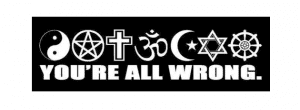Luke 11:14 Now he was casting out a demon that was mute; when the demon had gone out, the one who had been mute spoke, and the crowds were amazed. But some of them said, “He casts out demons by Beelzebul, the ruler of the demons.” Others, to test him, kept demanding from him a sign from heaven. But he knew what they were thinking and said to them, “Every kingdom divided against itself becomes a desert, and house falls on house. If Satan also is divided against himself, how will his kingdom stand? —for you say that I cast out the demons by Beelzebub. Now if I cast out the demons by Beelzebul, by whom do your exorcists cast them out? Therefore they will be your judges.
These verses are all too often forgotten in Christian reflection on non-Christian religions. But they point to a truth that is absolutely fundamental to all Christian theology as it considers that which is beyond the bounds of the Christian church.
In this passage Jesus has cast out a demon. And this directly attacks the monopoly on exorcism, and more generally righteousness, claimed by the Jewish religious leaders. Like many of the words and actions of Jesus (such as finding that gentiles have faith and Samaritans have righteousness) it undermines the exclusive claim of these leaders to possess God’s righteousness.
So they have a ready comeback. Jesus, they claim, can cast out demons because he calls upon the ruler of demons. In essence they say his control over demons must come from his allegiance to their king. His apparent righteousness is really just a deal with the devil.
Jesus answer to them has two parts, one logical and one ethical. Logically he points out that if the ruler of demons is now attacking his own servants then the the kingdom of the demons is going to disintegrate. Evil can’t endure if it isn’t united. It makes no sense for the ruler of demons to work against his own interests. Logically the accusation of the Jewish religious leaders is nonsensical.
More important is the second point, made when Jesus asks rhetorically, “by whom do your exorcists cast them out?” Good question. Once the accusation is made that demons are cast out by an appeal to the ruler of demons than the accusation can be made any time any demon is cast out. Just by looking at the result you wouldn’t be able to tell the difference between good exorcists and evil exorcists. Thus, as Jesus points out, “they will be your judges.” In trying to undermine Jesus the Jewish religious leaders have actually undermined their own people.
This is a critical point in inter-religious understanding. Everything good has only one source: God. When we see good being done, no matter the person’s religion, then God is at work. And if we ever doubt this, if we ever attribute good works to the author of evil we undermine our own moral universe, our own claim to act out of God’s righteousness.
If you cast doubt on the good done by a Hindu or a Muslim what is to keep you from doubting the good done by your fellow Christian – perhaps a Christian of a different denomination? As, I might add, has happened quite often in the past.
Indeed, if we ever begin to call good evil because we doubt the doer of good then in the end we’ll find it impossible to distinguish good from evil at all.
Now this may seem a little too abstract, but one of the great hindrances to Christians and Muslims working together in our civil society occurs when Christians assert that when Muslims do good it should be regarded as evil. They acknowledge that Muslims do good and say good things, but then assert that these are for evil purposes. Muslims are damned if they do and damned if they don’t.
As you might expect, the next step is to say that when Christians and Muslims do good together it is actually evil, because the Christians now have evil intentions or are deluded. The idea that good can be caused by evil now undermines confidence in the good done by other Christians. And that is a poison that spreads and spreads, until all good things become suspect, tainted by the possibility of ill intentions.
The resulting inability to tell the difference between the works of Satan and those of God ultimately undermines faith in God, since any of God’s good works through human persons become suspect as tricks of Satan.
Which, to return to scripture, is why this verse is so important. The foundations of the moral universe of the 1st century were undermined when those religious leaders accused Jesus of casting out demons by an appeal to the leader of the demons. And the foundations of our moral universe are slowly being eroded by those who claim, as do many leading politicians and no small number of Christian pastors, that we cannot trust that good Muslims are really good, or that good Mexicans are good, or good Mormons are good for that matter.
Perhaps, given the environment in which they work, we cannot expect politicians to know the difference between good and evil, between the servants of God and the servants of Satan. But we Christians should not be so misled. Only God is the author of good, and wherever and whenever you see good things done, God is at work, regardless of the ethnicity, nationality, or religion of the doer.
Matthew 7:16, You will know them by their fruits. Do men gather grapes from thornbushes or figs from thistles? 17 Even so, every good tree bears good fruit, but a bad tree bears bad fruit. 18 A good tree cannot bear bad fruit, nor can a bad tree bear good fruit. 19 Every tree that does not bear good fruit is cut down and thrown into the fire. 20 Therefore by their fruits you will know them.
Not by our suspicions, our fears, or our exclusive claims to righteousness.











